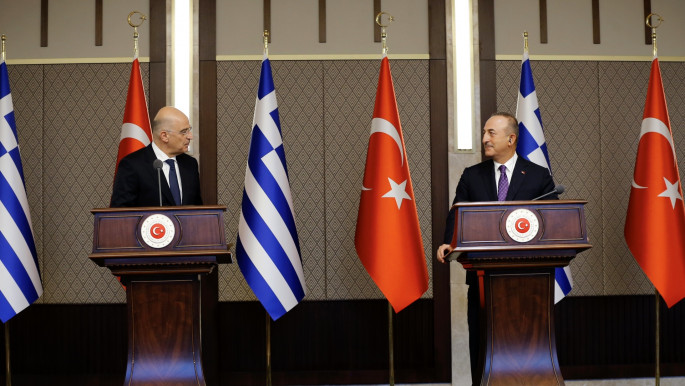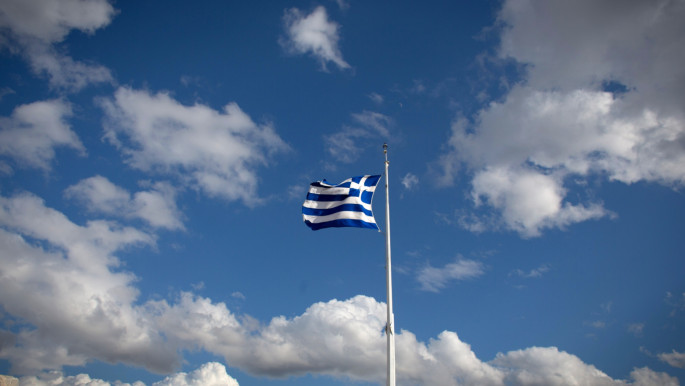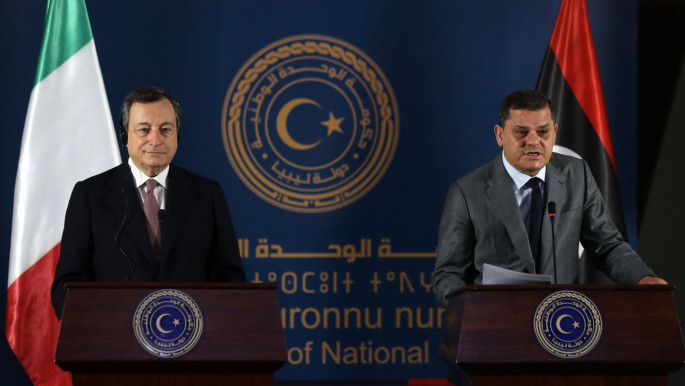No man's land: The Cyprus conflict in a polarised Eastern Mediterranean
The collapse of these informal talks revealed how fragile the political situation is in Cyprus, where key stakeholders of peace negotiations are also active players in the Eastern Mediterranean quarrel.
Since the failure of the last Cyprus peace negotiations in 2017, geopolitical polarisation in the Eastern Mediterranean region has escalated, and disputes regarding sea boundaries and the control of underwater natural gas fields have emerged between historical regional opponents.
Turkey's military interventions in Syria, Iraq, and Libya, in which Ankara has clashed with its regional competitors, have triggered the creation of two main regional camps, and have further muddied Turkey's relations with the EU.
Polarisation in the Eastern Mediterranean has been coupled by recent de-escalation efforts between opposing blocs, ultimately affecting the wider region of the Middle East. Within the context of a global pandemic, this de-escalation trend appears to have temporarily frozen confrontational attitudes between actors but has not addressed the core issues, as the failure of the Cyprus talks demonstrates.
 |
The island of Cyprus has been de facto divided since 1974, when a failed coup to achieve union with Greece triggered a Turkish military invasion of the north |  |
The Eastern Mediterranean and Cyprus disputes
The core factors of the current regional dispute in the Eastern Mediterranean are the delimitation and recognition of national sea boundaries. Moreover, the recognition of these maritime boundaries entails the control and exploitation of underwater natural gas fields.
The two main countries clashing over the control of national sea boundaries are Greece and Turkey, which have historically disputed their claims in the Aegean Sea and the Mediterranean, alongside Cyprus, who also plays a key role in this regional dispute.
 |
|
| Read more: What warming Egypt-Turkey ties could mean for the Middle East |
The island has been de facto divided since 1974, when a failed coup in Cyprus to achieve union with Greece (Enosis) triggered a Turkish military invasion of the north. Since then, the southern part of the island has been governed by the internationally recognised Republic of Cyprus, whereas the northern part has been ruled by the self-proclaimed Turkish Republic of Northern Cyprus (TRNC), only recognised by Turkey.
This de facto partition has left a grey zone in Cyprus where parties involved act according to their national interests. The discovery of underwater natural gas fields in the region during the 2009-2011 period has only increased competitivity in the Eastern Mediterranean, ultimately complicating a peace settlement in Cyprus.
Regional geopolitical trends: Polarisation and de-escalation
Since 2017, when the last Cyprus peace talks in Crans-Montana failed, division and polarisation in the Eastern Mediterranean have further increased. This tense regional scenario has triggered the creation of two main geopolitical blocs and alliances, where Turkey has acted as a negative or positive attraction pole, not only in the Eastern Mediterranean, but in the wider Middle East, with a particular impact on Gulf countries.
 |
Turkey's military interventions in Syria, Iraq, and Libya, in which Ankara has clashed with its competitors, have triggered the creation of two main regional camps |  |
The bloc opposing Turkish regional interests has gathered around two regional platforms, the East Med Gas Forum, and the Philia Forum. According to its founding members, these platforms have been set to promote regional economic cooperation (primarily on the energy market) to ultimately bring further stability and peace to the Eastern Mediterranean. The axis formed around these platforms has been further consolidated through multiple bilateral agreements between its partners.
Besides energy, one of the most important areas of collaboration has been the defence sector. Country members of these forums have signed bilateral agreements regarding military cooperation and weapons acquisition. Greece, for example, signed agreements in January for the acquisition of Israeli and French military equipment. Likewise, Cyprus has signed military cooperation agreements with Israel and the UAE.
Furthermore, this regional bloc showed unity during the Athens-Ankara spat of the past summer, as well as during the confrontations between Turkey and Cyprus regarding exploratory sea operations in Cypriot waters. For example, France sent naval and airborne units to Greece and Cyprus, while the UAE and Egypt held naval and air force exercises with Greece's armed forces. Furthermore, Saudi Arabia has recently deployed six F-15 jets to Crete.
"The East Med Gas and Philia Forums have put Turkey under pressure: either it makes peace with the members and joins the forums, or it finds itself increasingly surrounded in the Eastern Mediterranean region," Fiona Mullen, the Director of the Cyprus-based economic research consultancy firm Sapienta Economics, told The New Arab.
 |
|
| Read more: A new chapter in Greece's Middle East military strategy |
Since last summer, when confrontations between Turkey, Greece and Cyprus peaked, regional clashes have diminished in the Eastern Mediterranean and waters appear to have calmed down. This is partially attributable to EU carrots and sticks and Brussel's mediation.
Turkey and Greece restarted bilateral talks in January this year, and more recently, Turkey appears to be making efforts to reach out to regional competitors, as Ankara is now restarting diplomatic talks with Egypt and Israel. Alongside these two countries, Turkey has also showed interest in decreasing tensions with Saudi Arabia, openly implying its desire to "fix" diplomatic relations with Riyadh.
At the same time, Greece has also re-established its diplomatic and political relations with Libya's Government of National Accord (GNA). Furthermore, since last year, Turkey has not sent exploratory vessels to Cypriot waters, and tensions between Nicosia and Ankara have decreased.
Regional unpredictability and Cyprus peace talks
Despite this regional polarisation and increased militarisation, de-escalation efforts have also been made by the main parties in the Eastern Mediterranean.
"There are positive aspects regarding the current geopolitical scenario in the Eastern Mediterranean, since it made the international community interested in fixing the regional tensions, including the Cyprus problem," Fiona Mullen observed. "The EU is paying attention, the US has said it wants to be actively engaged and the British government is also keen to help. So, we are in a better situation than we were last summer."
 |
The East Med Gas and Philia Forums have put Turkey under pressure: either it makes peace with the members and joins the forums, or it finds itself increasingly surrounded in the Eastern Mediterranean region |  |
The EU is certainly playing a major role in the Eastern Mediterranean, as shown by its increased diplomatic activity with Turkey. EU reports regarding relations with Turkey, and the recent visit of EU heads to Ankara, reveal how important stability and security in the Eastern Mediterranean is for these relations.
European officials have repeatedly emphasised de-escalation efforts taken by Ankara, insisting as well on focusing on a compromise agenda with Ankara. Regarding Turkey's EU agenda, Fiona Mullen adds that "if Turkey is still interested in improving its relations with the EU, the fastest way to do it is through a peace settlement in Cyprus".
Still, Mullen says that "the Geneva result means the parties have decided to kick the can down the road. But they will have to deal with it eventually as none of the security risks have gone away."
 |
|
| Read more: Dbeibah and Draghi: A new era in Italy-Libya relations |
Although regional tensions in the Eastern Mediterranean have certainly decreased during these last few months, Mullen warns that "the big unknown in this scenario is how Turkey is going to behave. Turkey used to give long advance warnings of its plans, but President Erdogan is far more unpredictable, and the economy is in deep trouble. We don't know what he is going to do".
While the EU is making efforts to foster more stable and predictable relations with Ankara, past and recent developments in Turkey have shown otherwise.
Sudden changes in the Central Bank of Turkey's management, the crackdown against the Kurdish opposition Peoples' Democratic Party (HDP), or pulling out from the Istanbul Convention erode human rights protection and the rule of law. This situation ultimately jeopardises Turkey's predictability in future movements vis-à-vis EU interests, including Cyprus and the Eastern Mediterranean question.
The recent failure of the Cyprus peace talks has shown yet again the levels of unpredictability this region is exposed to, and how regional polarisation appears to have become one more layer in the complex peace negotiations.
With the failure of this recent attempt to solve the conflict in Cyprus, the UN Secretary General has called yet again for new meetings in "two or three months", as the ongoing conflict will play a central part in Eastern Mediterranean disputes in the near-future.
Xavier Palacios is a freelance political risk analyst based in Nicosia, Cyprus. His work as a researcher and analyst focuses on South East Europe and the Eastern Mediterranean, with a special interest in Turkish politics, history and culture.
Follow him on Twitter: @palaciosmengod




 Follow the Middle East's top stories in English at The New Arab on Google News
Follow the Middle East's top stories in English at The New Arab on Google News


